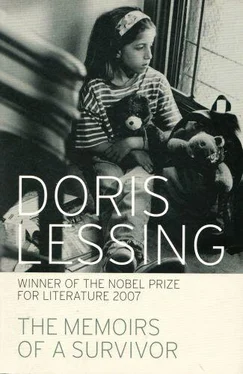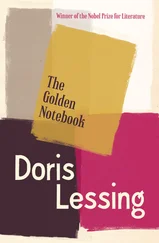Perhaps, after all, one has to end by characterising 'it' as a sort of cloud or emanation, but invisible, like the water vapour you know is present in the air of the room you sit in, makes part of the air you know is there when you look out of a window — your eye is traversing air, so your intellect tells you when you look at a sparrow pecking insects off a twig; and you know that the air is part water vapour which at any moment — as a slap of cold air comes in from somewhere else — will condense as mist or fall as rain. 'It' was everywhere, in everything, moved in our blood, our minds. 'It' was nothing that could be described once and for all, or pinned down, or kept stationary; 'it' was an illness, a tiredness, boils; 'it' was the pain of watching Emily, a fourteen-year-old girl, locked inside her necessity to — sweep away dead leaves; 'it' was the price or unreliability of the electricity supply; the way telephones didn't work; the migrating tribes of cannibals; was 'them' and their antics; 'it' was, finally, what you experienced… and was in the space behind the wall, moved the players behind the wall, just as much there as in our ordinary world where one hour followed another and life obeyed the unities, like a certain kind of play.
As that summer ended there was as bad a state of affairs in the space behind the wall as on this side, with us. Or perhaps it was only that I was seeing what went on there more clearly. Instead of entering into a room, or a passageway, where there was a door which opened into other rooms and passages, so that I was within a sense of opportunities and possibilities, but limited always to the next turn of the corridor, the opening of the next door — the sense of plenty, of space always opening out and away kept within a framework of order within which I was placed, as part of it — now it seemed as if a perspective had shifted and I was seeing the sets of rooms from above, or as if I were able to move through them so fast I could visit them all at once and exhaust them. At any rate, the feeling of surprise, of expectancy, had gone, and I could even say that these sets and suites of rooms, until so recently full of alternatives and possibilities, had absorbed into them something of the claustrophobic air of the realm of the 'personal' with its rigid necessities. And yet the disorder there had never been so great. Sometimes it seemed to me as if all those rooms had been set up, carefully, correct to the last detail, simply in order to be knocked flat again; as if a vast house had been taken over and decorated to display a hundred different manners, modes, epochs — but quite arbitrarily, not consecutively and in order to give a sense of the growth of one style into another. Set up, perfected — and then knocked flat.
I cannot begin to give an idea of the mess in those rooms. Perhaps I could not go into a room at all, it was so heaped with cracking and splintering furniture. Other rooms had been used, or so they looked, as refuse dumps: stinking piles of rubbish filled them. Some had their furniture neatly set out in them, but the roofs had gone, or the walls gaped. Once I saw in the centre of a formal and rich room — French, Second Empire, as lifeless as if it had been arranged for a museum — the remains of a fire built on a piece of old iron, some sleeping bags left anyhow, a big pot full of cold boiled potatoes near the wall in line with a dozen pairs of boots. I knew the soldiers would come back suddenly, and if I wanted to keep my life I should leave. Already there was a corpse, with dried blood staining the carpet around it.
And yet, with all these evidences of destructiveness, even now I could not move behind the wall without feeling something of the old expectation, hope, even longing. And rightly, for when the anarchy was at its height, and I had almost lost the habit of expecting anything but smashed and dirtied rooms, there was a visit when I found this — I was in a garden between four walls, old brick walls, and there was a fresh delightful sky above me that I knew was the sky of another world, not ours. This garden did have a few flowers in it, but mostly it had vegetables. There were beds neatly filled with greenery — carrot tops, lettuces, radishes, and there were tomatoes, and gooseberry bushes and ripening melons. Some beds were raked and ready for planting, others had been turned and left open to the sun and the air. It was a place filled with industry, usefulness, hope. I walked there under a fruitful sky, and thought of how people would be fed from this garden. But this wasn't all, for I became aware that under this garden was another. I was able easily to make my way down into it along a sloping ramp of earth, and there were even steps of, I think, stone. I was down in the lower garden which was immediately under the first, and occupied the same area: the feeling of comfort and security this gave me is really not describable. Nor was this lower garden any less supplied with sun, wind, rain, than the upper one. Here, too, were the tall warm walls of weathered brick, and the beds in various stages of preparedness and use. There was an exquisite old rose growing on one wall. It was a soft yellow, and its scent was in all the air of the garden. Some pinks and mignonette grew near a sunny old stone: these were the old flowers, rather small, but subtle and individual: all the old cottage flowers were here, among the leeks and the garlics and the mints. There was a gardener. I saw him at the moment I realised I was listening with pleasure to the sound of water running near my feet where there was a channel of earth, with tiny herbs and grasses growing along its edges. Near the wall the channel was of stone, and wider: the gardener was bending over the stone runnel where it came into the garden from outside through a low opening that was green and soft with moss. Around every bed was a stream of clear water, the garden was a network of water channels. And, looking up and beyond the wall, I saw that the water came from the mountains four or five miles away. There was snow on them, although it was midsummer, and this was melted snow-water, very cold, and tasting of the air that blew across the mountains. The gardener turned when I ran towards him to ask if he had news of the person whose presence was so strong in this place, as pervasive as the rose-scent, but he only nodded and turned back to his duties of controlling the flow of water, of seeing that it ran equably among the beds. I looked across at the mountains and at the plain between, where there were villages and large stone houses in gardens, and I thought that what I was looking at was the under-world — and one just as extensive and productive — of the level to which I now had to return. I walked up to the first level again, and saw the old walls warm with evening sunlight, heard water running everywhere though I had not heard it when I stood here before; I took small cautious steps from one solid but moist spot to the next, with the smell of apple — mint coming up from my knees and the sound of bees in my ears. I looked at the food the earth was making, which would keep the next winter safe for us, for the world's people. Gardens beneath gardens, gardens above gardens: the food-giving surfaces of the earth doubled, trebled, endless — the plenty of it, the richness, the generosity…
And back in my ordinary life I watched June listless in a deep chair, shaking her head with a patient smile at a plate of food being held towards her by Emily.
'But she has to eat, hasn't she?' said Emily to me, sharp with worry, and when the child continued to smile and refuse, Emily whirled about and set the plate down in front of Hugo who, knowing he was being used to demonstrate rejection, as if she were tipping food into a rubbish bin, turned his face away. I saw Emily then, all loving remorse, sit by her neglected slave, and put her face down into his fur, as once she had so often been used to do. I saw how he turned his head a little towards her, despite his intention not to show response, let alone pleasure. Despite himself, he licked her hand a little, with a look on him that a person has when doing something he doesn't want to do, but can't stop… and she sat and wept, she wept. There they were, the three of them, June with her malady, whatever it was, the ugly yellow beast in his humility, suffering his heartache, and the fierce young woman. I sat quiet among the three of them, and thought of the gardens that lay one above another so close to us, behind a wall which at this time of the day — it was evening — lay quite blank and with no depth in it, no promise. I thought of what riches there were in store for these creatures and all the others like them; and though it was hard to maintain a knowledge of that other world with its scent and running waters and its many plants while I sat here in this dull shabby daytime room, the pavement outside seething as usual with its tribal life — I did hold it. I kept it in my mind. I was able to do this. Yes, towards the end it was so; intimations of that life, or lives, became more powerful and frequent in 'ordinary' life, as if that place were feeding and sustaining us, and wished us to know it. A wind blew from one place to the other; the air of one place was the air of the other; as I came to the window after an escape into the space behind the wall there would be a moment of doubt, my mind would sway and have to steady itself as I reassured myself that no, what I was looking at was reality, was real life; I was standing foursquare in what everybody would concur was normality.
Читать дальше
Конец ознакомительного отрывка
Купить книгу












